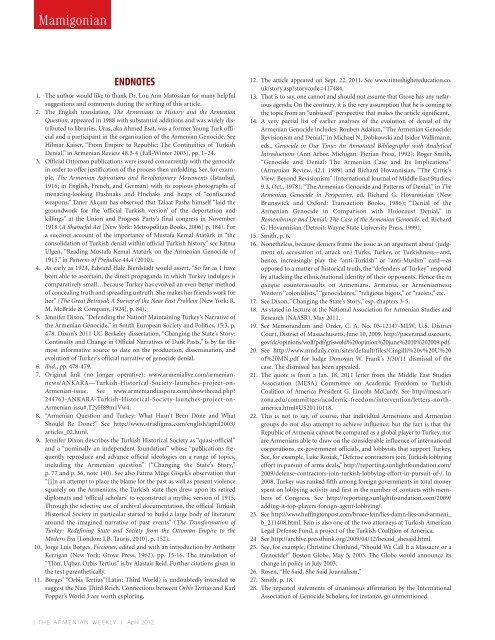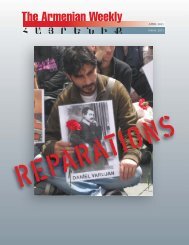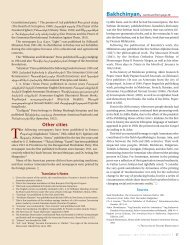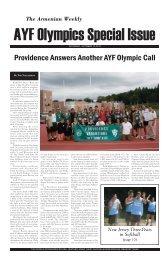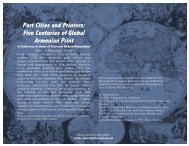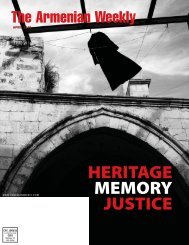Armenian Weekly April 2012 Magazine
Armenian Weekly April 2012 Magazine
Armenian Weekly April 2012 Magazine
You also want an ePaper? Increase the reach of your titles
YUMPU automatically turns print PDFs into web optimized ePapers that Google loves.
Mamigonian<br />
ENDNOTES<br />
1. The author would like to thank Dr. Lou Ann Matossian for many helpful<br />
suggestions and comments during the writing of this article.<br />
2. The English translation, The <strong>Armenian</strong>s in History and the <strong>Armenian</strong><br />
Question, appeared in 1988 with substantial additions and was widely distributed<br />
to libraries. Uras, aka Ahmed Esat, was a former Young Turk official<br />
and a participant in the organization of the <strong>Armenian</strong> Genocide. See<br />
Hilmar Kaiser, “From Empire to Republic: The Continuities of Turkish<br />
Denial,” in <strong>Armenian</strong> Review 48.3-4 (Fall-Winter 2003), pp. 1–24.<br />
3. Official Ottoman publications were issued concurrently with the genocide<br />
in order to offer justification of the process then unfolding. See, for example,<br />
The <strong>Armenian</strong> Aspirations and Revolutionary Movements (Istanbul,<br />
1916; in English, French, and German) with its copious photographs of<br />
menacing-looking Dashnaks and Hnchaks and heaps of “confiscated<br />
weapons.” Taner Akçam has observed that Talaat Pasha himself “laid the<br />
groundwork for the ‘official Turkish version’ of the deportation and<br />
killings” at the Union and Progress Party’s final congress in November<br />
1918 (A Shameful Act [New York: Metropolitan Books, 2006] p. 184). For<br />
a succinct account of the importance of Mustafa Kemal Atatürk in “the<br />
consolidation of Turkish denial within official Turkish history” see Fatma<br />
Ulgen, “Reading Mustafa Kemal Atatürk on the <strong>Armenian</strong> Genocide of<br />
1915,” in Patterns of Prejudice 44.4 (2010).<br />
4. As early as 1924, Edward Hale Bierdstadt would assert, “So far as I have<br />
been able to ascertain, the direct propaganda in which Turkey indulges is<br />
comparatively small…because Turkey has evolved an even better method<br />
of concealing truth and spreading untruth. She makes her friends work for<br />
her” (The Great Betrayal: A Survey of the Near East Problem [New York: R.<br />
M. McBride & Company, 1924], p. 84).<br />
5. Jennifer Dixon, “Defending the Nation? Maintaining Turkey’s Narrative of<br />
the <strong>Armenian</strong> Genocide,” in South European Society and Politics, 15:3, p.<br />
478. Dixon’s 2011 UC Berkeley dissertation, “Changing the State’s Story:<br />
Continuity and Change in Official Narratives of Dark Pasts,” is by far the<br />
most informative source to date on the production, dissemination, and<br />
evolution of Turkey’s official narrative of genocide denial.<br />
6. ibid., pp. 478-479.<br />
7. Original link (no longer operative): www.armenialive.com/armenian-<br />
news/ANKARA—Turkish-Historical-Society-launches-project-on-<br />
<strong>Armenian</strong>-issue. See www.armeniandiaspora.com/showthread.php?<br />
244763-ANKARA-Turkish-Historical-Society-launches-project-on-<br />
<strong>Armenian</strong>-issu#.T2yH89m1Vw4.<br />
8. “<strong>Armenian</strong> Question and Turkey: What Hasn’t Been Done and What<br />
Should Be Done?” See http://www.stradigma.com/english/april2003/<br />
articles_02.html.<br />
9. Jennifer Dixon describes the Turkish Historical Society as “quasi-official”<br />
and a “nominally an independent foundation” whose “publications frequently<br />
reproduce and advance official ideologies on a range of topics,<br />
including the <strong>Armenian</strong> question” (“Changing the State’s Story,”<br />
p. 77 and p. 56, note 140). See also Fatma Müge Göçek’s observation that<br />
“[i]n an attempt to place the blame for the past as well as present violence<br />
squarely on the <strong>Armenian</strong>s, the Turkish state then drew upon its retired<br />
diplomats and ‘official scholars’ to reconstruct a mythic version of 1915.<br />
Through the selective use of archival documentation, the official Turkish<br />
Historical Society in particular started to build a large body of literature<br />
around the imagined narrative of past events” (The Transformation of<br />
Turkey: Redefining State and Society from the Ottoman Empire to the<br />
Modern Era [London: I.B. Tauris, 2010], p. 152).<br />
10. Jorge Luis Borges, Ficciones, edited and with an introduction by Anthony<br />
Kerrigan (New York: Grove Press, 1962), pp. 15-16. The translation of<br />
“Tlön, Uqbar, Orbis Tertius” is by Alastair Reid. Further citations given in<br />
the text parenthetically.<br />
11. Borges’ “Orbis Tertius”(Latin: Third World) is undoubtedly intended to<br />
suggest the Nazi Third Reich. Connections between Orbis Tertius and Karl<br />
Popper’s World 3 are worth exploring.<br />
12. The article appeared on Sept. 22, 2011. See www.timeshighereducation.co.<br />
uk/story.asp?storycode=417484.<br />
13. That is to say, one cannot and should not assume that Grove has any nefarious<br />
agenda. On the contrary, it is the very assumption that he is coming to<br />
the topic from an “unbiased” perspective that makes the article significant.<br />
14. A very partial list of earlier analyses of the evolution of denial of the<br />
<strong>Armenian</strong> Genocide includes: Rouben Adalian, “The <strong>Armenian</strong> Genocide:<br />
Revisionism and Denial,” in Michael N. Dobkowski and Isidor Wallimann.<br />
eds., Genocide in Our Time: An Annotated Bibliography with Analytical<br />
Introductions (Ann Arbor. Michigan: Pierian Press, 1992); Roger Smith,<br />
“Genocide and Denial: The <strong>Armenian</strong> Case and Its Implications”<br />
(<strong>Armenian</strong> Review, 42.1 1989) and Richard Hovannisian, “The Critic’s<br />
View: Beyond Revisionism” (International Journal of Middle East Studies,<br />
9.3, Oct., 1978); “The <strong>Armenian</strong> Genocide and Patterns of Denial,” in The<br />
<strong>Armenian</strong> Genocide in Perspective, ed. Richard G. Hovannisian (New<br />
Brunswick and Oxford: Transaction Books, 1986); “Denial of the<br />
<strong>Armenian</strong> Genocide in Comparison with Holocaust Denial,” in<br />
Remembrance and Denial: The Case of the <strong>Armenian</strong> Genocide, ed. Richard<br />
G. Hovannisian (Detroit: Wayne State University Press, 1999).<br />
15. Smith, p. 6.<br />
16. Nonetheless, because deniers frame the issue as an argument about (judgment<br />
of, accusation of, attack on) Turks, Turkey, or Turkishness—and,<br />
hence, increasingly play the “anti-Turkish” or “anti-Muslim” card—as<br />
opposed to a matter of historical truth, the “defenders of Turkey” respond<br />
by attacking the ethnic/national identity of their opponents. Hence the tu<br />
quoque counterassaults on <strong>Armenian</strong>s, Armenia, or <strong>Armenian</strong>ness;<br />
Western “colonialists,” “genocidaires,” “religious bigots,” or “racists,” etc.<br />
17. See Dixon, “Changing the State’s Story,” esp. chapters 3-5.<br />
18. As stated in lecture at the National Association for <strong>Armenian</strong> Studies and<br />
Research (NAASR), May 2011.<br />
19. See Memorandum and Order, C. A. No. 05-12147-MLW, U.S. District<br />
Court, District of Massachusetts, June 10, 2009. http://pacer.mad.uscourts.<br />
gov/dc/opinions/wolf/pdf/griswold%20opinion%20june%2010%202009.pdf.<br />
20. See http://www.mndaily.com/sites/default/files/Cingilli%20v%20U%20<br />
of%20MN.pdf for Judge Donovan W. Frank’s 3/30/11 dismissal of the<br />
case. The dismissal has been appealed.<br />
21. The quote is from a Jan. 18, 2011 letter from the Middle East Studies<br />
Association (MESA) Committee on Academic Freedom to Turkish<br />
Coalition of America President G. Lincoln McCurdy. See http://mesa.arizona.edu/committees/academic-freedom/intervention/letters-northamerica.html#US20110118.<br />
22. This is not to say, of course, that individual <strong>Armenian</strong>s and <strong>Armenian</strong><br />
groups do not also attempt to achieve influence; but the fact is that the<br />
Republic of Armenia cannot be compared as a global player to Turkey, nor<br />
are <strong>Armenian</strong>s able to draw on the considerable influence of international<br />
corporations, ex-government officials, and lobbyists that support Turkey.<br />
See, for example, Luke Rosiak, “Defense contractors join Turkish lobbying<br />
effort in pursuit of arms deals,” http://reporting.sunlightfoundation.com/<br />
2009/defense-contractors-join-turkish-lobbying-effort-in-pursuit-of-/. In<br />
2008, Turkey was ranked fifth among foreign governments in total money<br />
spent on lobbying activity and first in the number of contacts with members<br />
of Congress. See http://reporting.sunlightfoundation.com/2009/<br />
adding-it-top-players-foreign-agent-lobbying/.<br />
23. See http://www.huffingtonpost.com/bruce-fein/lies-damn-lies-and-armeni_<br />
b_211408.html. Fein is also one of the two attorneys at Turkish American<br />
Legal Defense Fund, a project of the Turkish Coalition of America.<br />
24 See http://archive.pressthink.org/2009/04/12/hesaid_shesaid.html.<br />
25. See, for example, Christine Chinlund, “Should We Call It a Massacre or a<br />
Genocide?” Boston Globe, May 5, 2003. The Globe would announce its<br />
change in policy in July 2003.<br />
26. Rosen, “He Said, She Said Journalism.”<br />
27. Smith, p. 18.<br />
28. The repeated statements of unanimous affirmation by the International<br />
Association of Genocide Scholars, for instance, go unmentioned.<br />
| THE ARMENIAN WEEKLY | <strong>April</strong> <strong>2012</strong>


